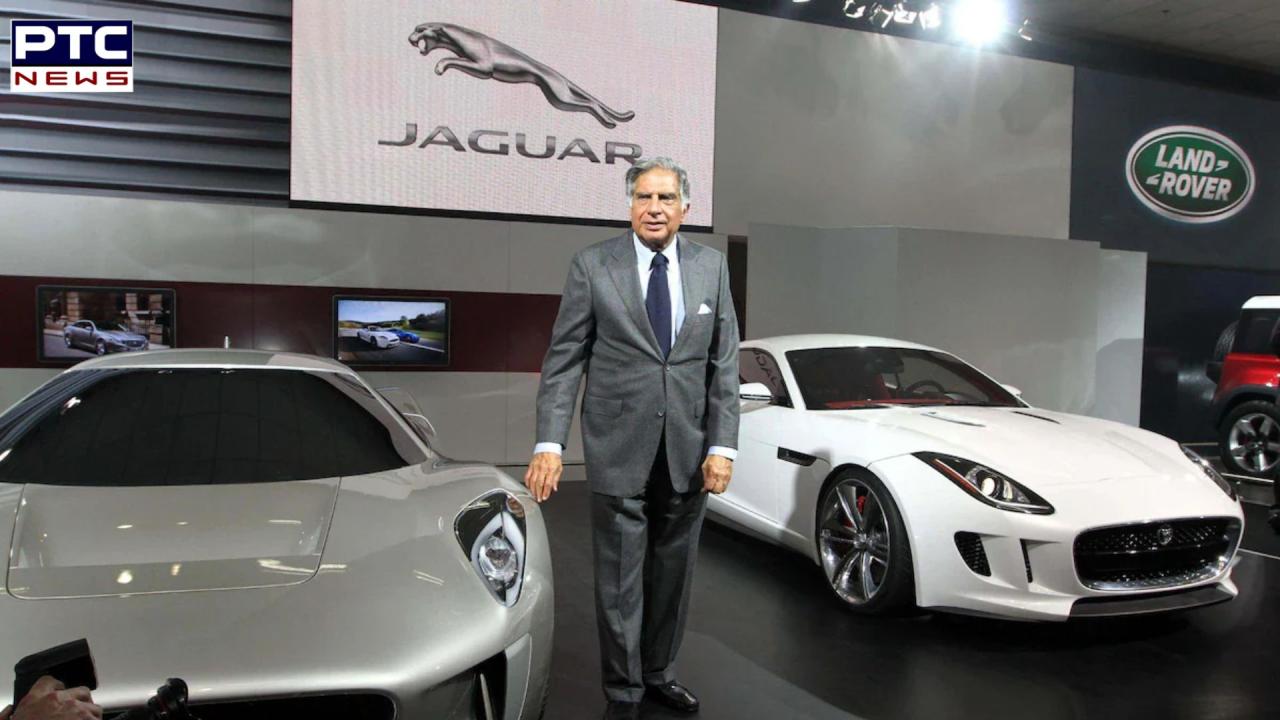- March 25, 2025
- Updated 2:22 am
The Jaguar Land Rover journey: How Ratan Tata turned Ford’s rejection into triumph
PTC News Desk: In March 2008, the global automotive world turned its eyes to India. News broke of Ratan Tata’s monumental $2.3 billion acquisition of two iconic British car brands—Jaguar and Land Rover—from Ford Motor Company. This deal not only marked a turning point for the Indian automotive industry but also symbolised a major leap for India’s corporate presence on the global stage. Tata Motors beat out domestic rival Mahindra and Mahindra, signaling the rise of Indian enterprise in the global market.
This historic purchase was hailed as India’s “Neil Armstrong moment”—a single step for Tata but a giant leap for India’s industrial brand. For Ratan Tata, the transaction was more than just a business win. It was a personal triumph, following a prior snub by Ford that had left him humiliated years earlier.
The Beginning: Tata Indica and the Setback with Ford
The story of Ratan Tata’s ultimate victory begins a decade earlier in 1998, with the launch of the Tata Indica, India’s first indigenously designed and diesel-powered hatchback. The car held sentimental value for Ratan Tata, symbolizing India’s ambition to establish itself as a competitive force in the global automotive sector.
However, the Indica’s early sales were disappointing. Faced with mounting losses, Ratan Tata made a bold decision to cut his losses and sell off the production unit to Ford. In 1999, Tata flew to the United States to meet Ford’s then-CEO, Bill Ford. But the meeting took a humiliating turn. Bill Ford reportedly berated Ratan Tata, saying that Tata Motors had no business being in the automotive sector and that buying Tata’s plant would be a “favor” to the Indian company.
Embarrassed and discouraged, Ratan Tata returned to India, but not without a renewed sense of determination. The rejection fueled his desire to prove Ford, and other critics, wrong.
A Turning Point: The Rise of Tata Motors
Despite the initial setback, Ratan Tata did not abandon the Indica. Instead, he doubled down on improving the car and building Tata Motors’ reputation. By 2004, Tata Motors began exporting the Indica to European and African markets. By 2007, domestic sales of the Indica peaked at 142,000 units, and the car had become a symbol of Indian manufacturing success.
Meanwhile, the global economy shifted. By 2008, Ford found itself struggling in the midst of the Great Recession, and the company’s financial woes deepened. Ford was near bankruptcy, saved only by a government line of credit. The tables had turned.
Seizing the opportunity, Ratan Tata moved swiftly. In a masterstroke of business acumen, Tata Motors acquired Jaguar and Land Rover from Ford. Ironically, Ford executives reportedly acknowledged that Tata was now doing them a “favor” by taking the brands off their hands.
Also Read: Simi Grewal remembers Ratan Tata as a cherished friend: ‘It’s too hard to bear your loss’
A Deal for the Ages: Jaguar and Land Rover’s Revival
For Ratan Tata, the acquisition was not merely an act of revenge; it was a strategic business decision. Jaguar, although struggling at the time, was one of the world’s most prestigious luxury and sports car brands. Land Rover, meanwhile, had experienced record sales in the three years leading up to the deal, including $1 billion in 2007-08 alone.
At the Geneva Motor Show in Switzerland, shortly after the acquisition was announced, Ratan Tata stated, “There is no reason to tinker with the brands… our challenge is to make them grow.”
Under Tata’s leadership, Jaguar Land Rover (JLR) experienced a dramatic turnaround. By 2011, JLR’s sales had surged to £9.87 billion, and by 2018, they had more than doubled to over £25 billion. In the fiscal year 2024, JLR reported sales of over 400,000 vehicles—a testament to the successful revival of the iconic brands.
Also Read: Who will carry Ratan Tata’s legacy? A look at the potential heirs of the Tata group
A Legacy of Determination and Resilience
Ratan Tata’s acquisition of Jaguar and Land Rover is now a landmark moment in the history of Indian business. The deal demonstrated the power of perseverance, vision, and resilience in the face of adversity. It also established Tata Motors as a global player in the automotive industry, showcasing India’s potential on the world stage.
Industrialist Vedant Birla reflected on this achievement in a post on social media platform X in June 2022, marking the 14th anniversary of the acquisition. He wrote, “Tata stepped into the global motor industry from there and has been a world player since…”
Ratan Tata’s journey from humiliation to global success is a powerful reminder of what can be achieved with hard work, determination, and an unyielding belief in one’s vision.
Recent Posts
- Crown of goddess Kali, gifted by PM Modi, stolen from temple in Bangladesh
- Hezbollah leader survives assassination attempt amid Israeli strikes that kill 22 in Beirut
- ਕ੍ਰਿਕਟ ਦੇ ਬਦਲੇ ਨਿਯਮ, ਹੁਣ ਇਸ ਕੇਸ ‘ਚ ਦੁਬਾਰਾ ਨਹੀਂ ਮਿਲੇਗੀ ਬੈਟਿੰਗ, ਮੰਨਿਆ ਜਾਵੇਗਾ
- ਸਚਿਨ ਤੇਂਦੁਲਕਰ ਦੇ ਬਰਾਬਰ ਪਹੁੰਚੇ ਜੋ ਰੂਟ, ਪਰ ਵਿਰਾਟ ਦੇ ਇਸ ਰਿਕਾਰਡ ਤੋਂ ਅਜੇ ਵੀ ਦੂਰ
- Ratan tata death: ਸਿਰਫ ਵੋਲਟਾਸ ਹੀ ਨਹੀਂ, ਸਵੇਰ ਤੋਂ ਰਾਤ ਤੱਕ ਤੁਹਾਡਾ ਕੰਮ ਟਾਟਾ ਦੇ ਬਿਨਾਂ ਨਹੀਂ ਚੱਲ ਸਕਦਾ
